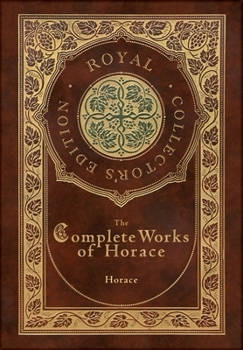The Complete Works of Horace (Royal Collector's Edition) (Case Laminate Hardcover with Jacket)
Many of Horace's poems contain much reflection on genre, the lyric tradition, and the function of poetry. His Satires present a medley of philosophical programs, dished up in no particular order - a style of argument typical of the genre. The "Odes" weave various philosophical strands together, with allusions and statements of doctrine present in about a third of the Odes Books 1-3, ranging from the flippant to the solemn, while Ambiguity is the hallmark of the Epistles.
Horace composed in traditional metres borrowed from Archaic Greece, employing hexameters in his Satires and Epistles, and iambs in his Epodes, all of which were relatively easy to adapt into Latin forms. His Odes featured more complex measures, including alcaics and sapphics, which were sometimes a difficult fit for Latin structure and syntax. Despite these traditional metres, he presented himself as a partisan in the development of a new and sophisticated style.
This case laminate collector's edition includes a Victorian-inspired dust jacket.
Related Subjects
Poetry




